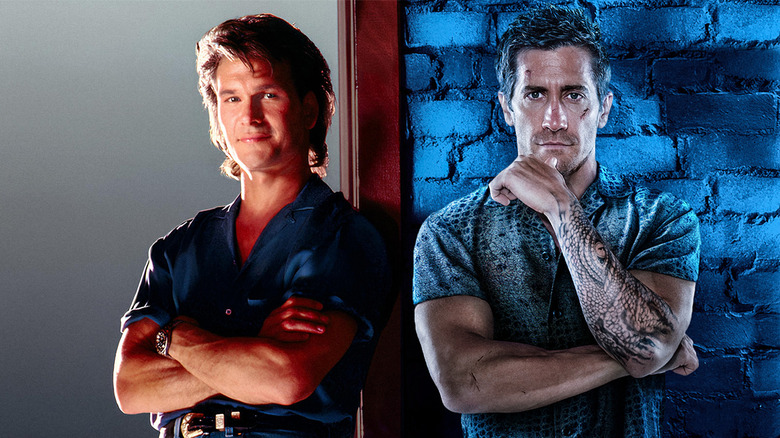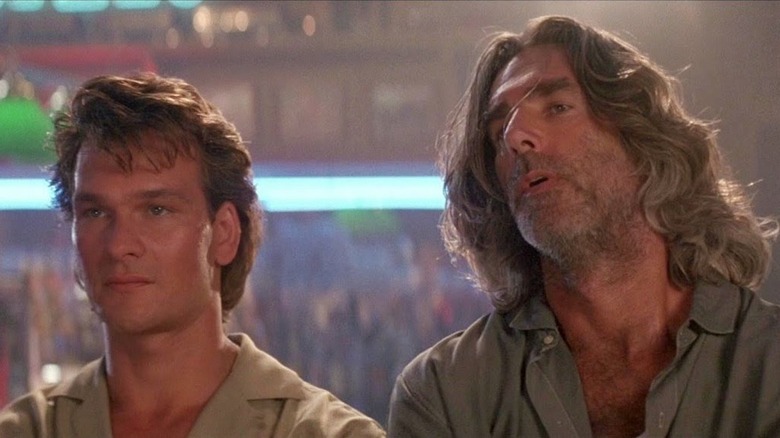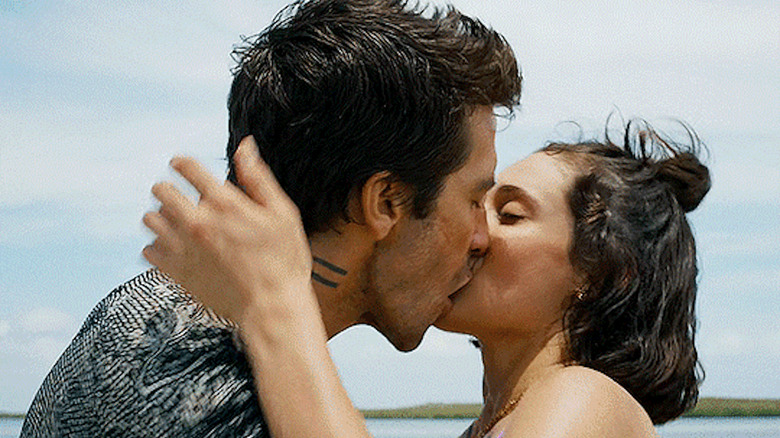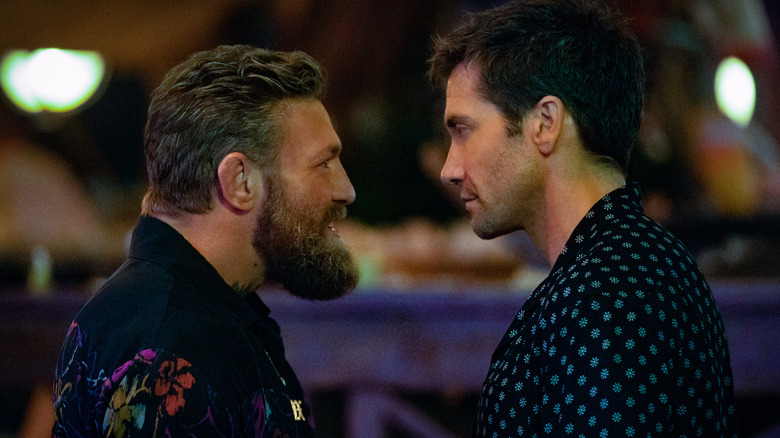How The Road House Remake Compares To The Original Classic
The 1989 summer movie season might've officially kicked off on Memorial Day weekend with the release of Steven Spielberg's "Indiana Jones and the Last Crusade," but having been a movie-mad 15-year-old kid at the time, I can assure you that May's first adrenalized action spectacular opened a week earlier when Patrick Swayze introduced us to a man named Dalton in the instant s***-kicker classic "Road House." Critics initially wrote it off as a mindless meathead programmer from mayhem merchant Joel Silver, but the aptly-monikered director Rowdy Herrington and the screenwriting duo of David Lee Henry and Hilary Henkin understood their ludicrous assignment and aced it with knowing aplomb. Their unabashed commitment to inherently risible material turned "Road House" into the "Citizen Kane" of bar bouncer movies.
Of course, "Road House" was, for a long time, the only bar bouncer movie ever made. Surprisingly, given the film's enduring popularity, few directors have attempted to exploit this highly specialized subculture. Aside from the forgettable direct-to-DVD sequel, "Road House 2," starring Johnathon Schaech, and the 2018 Jean-Claude Van Damme vehicle "The Bouncer" (which I'll confess I have not seen), the "cooler" craft has largely gone ignored. Perhaps everyone was just waiting for the inevitable remake.
35 years later, after numerous false starts (including a proposed version starring former MMA sensation Ronda Rousey) that remake has finally arrived – and 2024's "Road House" has got quite the pedigree. Top-lined by A-lister Jake Gyllenhaal and directed by the sporadically great Doug Liman, this is no Easter-egg-laden nostalgia trip (absent one ill-advised ADR insertion), nor is it a wink-heavy goof. It's an impressively slick piece of big-budget action cinema. It's a formidable work in its way, but how does it compare to Herrington's "Road House?"
For an OG "Road House" connoisseur, this is a complicated matter.
The bouncer as Old West sheriff
Herrington's "Road House" is immensely satisfying because it's blatantly a classic Hollywood Western set in the bar industry. Lots of people go to bars, but how often do they think about the in-house politics? What makes a well-managed watering hole hum, and how do they keep the peace when the product they serve has the nasty tendency to bring out the animal in some of their patrons?
In Herrington's film, it's the same as employing the right kind of sheriff to govern a town full of outlaws. You're looking for a man who's hard, but relatable; respected, but not quite feared. Swayze's Dalton is that man. He's the best there is. And he's just the guy Missouri businessman Frank Tilghman (Kevin Tighe) needs to tame his out-of-control club, the Double Deuce (the kind of place where "they sweep up the eyeballs after closing"). Though Dalton protests that Wade Garrett (Sam Elliott) is still the cooler king, he accepts Tilghman's incredibly generous offer and rides into a backwater Missouri town to restore law and order... to a bar.
Henry and Henkin's script is cleverly nuanced. Dalton takes a Zen-like approach to his gig. He preaches the gospel of "be nice, until it's time to not be nice." He does tai-chi. He sews up his own knife wounds sans anesthetic. He seduces the brainy Dr. Elizabeth Clay (Kelly Lynch) with his NYU philosophy degree. After firing a couple of bad apples, he turns the Double Deuce staffers into a booze-pouring family. And when Dalton runs afoul of goons employed by local crime kingpin Brad Wesley (Ben Gazzara), he brings in the lovably greasy Garrett for bouncer backup.
Get you a man who can do anything? As Jeff Healey, the leader of the Double Deuce house band says, the name is Dalton.
How does Gyllenhaal's Dalton measure up?
A Dalton who is neither nice nor educated
As written by the Shane Black-associated duo of Anthony Bagarozzi and Charles Mondry, Gyllenhaal's Elwood Dalton is a headcase with a death wish. Whereas Swayze's Dalton had his own troubling anger issues (which typically manifested in ripping the throats out of bad dudes in, to be fair, kill-or-be-killed situations), the Gyllenhaal variation has a rage switch that, once it's flipped, turns him into a complete psychopath. There's a monster lurking within Dalton, and when it inevitably surfaces, Liman's film goes utterly bonkers in a wildly unsettling fashion.
Before we get there, we learn that Dalton is a former UFC star who brutally killed an opponent in the ring. He apparently makes money hustling underground fighting rings, but it's not a terribly effective scam given his erstwhile prominence. Nevertheless, he's exactly the bruiser Florida Keys businesswoman Frankie (Jessica Williams) is looking for to tame her out-of-control club The Road House. (There is a Double Deuce Restaurant in town, but it's a quiet-looking establishment situated next to the used book store run by a father and daughter Dalton befriends upon arriving in town).
Dalton reluctantly accepts the gig, and quickly finds himself contending with goons employed by local crime kingpin Ben Brandt (a painfully miscast Billy Magnussen), who's hot to swipe Frankie's oceanfront property. Dalton predictably does his thing, and, initially, Gyllenhaal's nonchalant demeanor whilst cracking skulls and snapping bones is a hoot. But in lieu of letting us watch Dalton bond with the Road House staff, Liman thrusts his protagonist into a crazily convoluted corruption scheme that seems to involve just about everyone in the town.
The result is an unwieldy melding of Arthur Penn's "Night Moves" and a Travis McGee novel John D. MacDonald wisely left in his drawer. And then the truly nutty third act arrives.
Conor McGregor (not quite) to the rescue?
One of the most damaging choices Liman and his writers made with their "Road House" was turning Dalton into an unhinged loner. Daniela Melchior is given the unenviable assignment of striking romantic sparks with Gyllenhaal's screw-up, but there's no warmth between the two, let alone heat. This Dalton arguably needed a Wade Garrett more than Swayze's iteration. Swayze could coast on his innate sweetness, but Gyllenhaal, who can be a total charmer, opts to play Dalton in more of a sad-eyed key. It's a bizarre choice, and one that alienates the audience once the stone-cold killer in Dalton comes out (his failed attempt to pin a murder on a deputy, and unfazed response to getting caught, is straight out of a malevolent Jim Thompson noir).
The sole advantage Liman's "Road House" has over Herrington's film is its anti-Dalton. Regardless of how I feel about Conor McGregor as a person, his demonically savage Knox takes over the film upon his arrival. And though he doesn't get an all-timer quip like Marshall R. Teague's Jimmy in the '89 film ("I used to f*** guys like you in prison"), we totally buy that he can destroy Dalton in a fight — which he mostly does in their two superbly choreographed-and-shot altercations.
As for the chaotic boat-chase set piece that precedes the final Dalton-Knox brawl, it's impressive in a vacuum, but also dramatically inert because Dalton's stupidly elaborate plan nearly backfires on him. He isn't ahead of the game. He's neck-deep in a morass of corruption he doesn't understand, and nearly gets the woman he kinda-sorta cares about killed in the process. He plays it like a meathead, not a graduate of NYU's philosophy program. That it all works out in the end is sheer luck.
And that's the ultimate failure of Liman's "Road House": unlike the great Westerns that Herrington expertly emulated, we want Dalton to leave town. Get that man out of Dodge and let him return to the not-exactly-tragic task of destroying his own life. These people deserve a better class of cooler.



